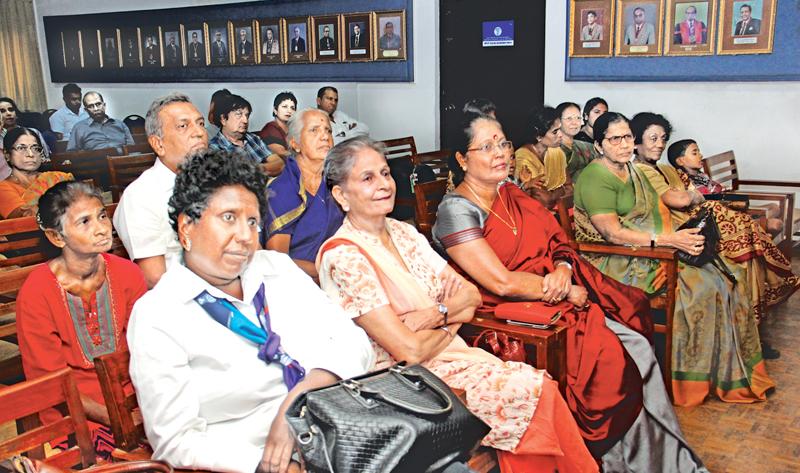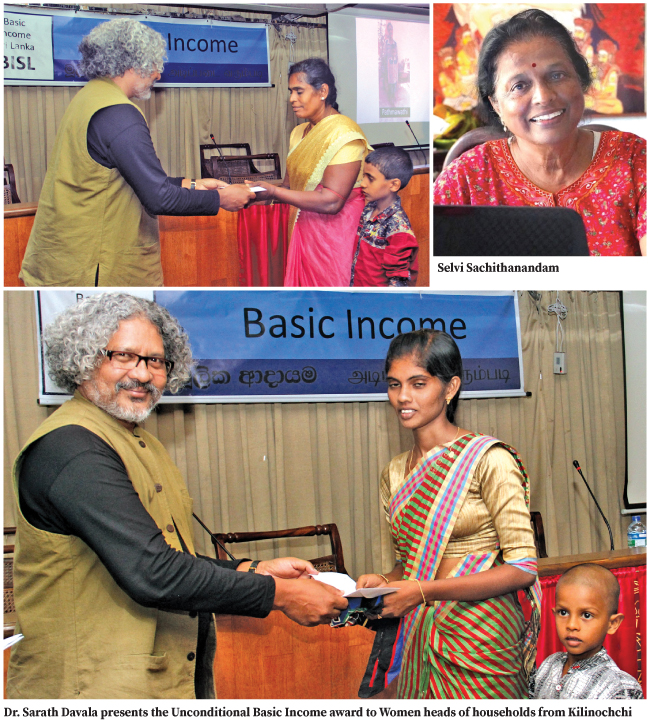
Dr. Sarath Davala, the coordinator for India Network for Basic Income (INBI), presented the Indian experience in trying out a basic income model in India at the OPA auditorium last week.
He spoke on ‘Emancipatory powers of Basic Income’ especially on the vulnerable women and the disabled.
This pilot project funded by UNICEF, passed the test in gold standards of randomised controlled trials (RCT) and has been hailed as a very successfully and scientifically conducted trial to ascertain the sustainability of the concept of Basic Income.
The presentation was hosted by Basic Income Sri Lanka (BISL) and organised by this writer. Basic Income Sri Lanka (BISL) was set up by a few like-minded people to raise awareness of the concept and the importance of Basic Income in the current economic context.
In the current economic context human well being is in crisis: Whether we look at the way politicians are these days or how women fit into the current paradigm, how children survive, how the old are treated and the way LGBTI community are perceived, the plight of the animals, the depleted forests, the scarred earth, the poisoned water, the polluted air, the contaminated oceans, in fact the entire planet is in crisis even without mentioning wars and the mass scale displacement of people.
“No problem can be solved from the same level of consciousness that created it.” Albert Einstein rightly pointed out. We need to explore an alternative paradigm, a major policy shift in the way we look at work, wages and human security in order to deal with the current dilemma. Unconditional Basic Income (UBI) seems to be one way to take on this task.
BISL Activities
Recently BISL held workshops among the vulnerable groups in society: Voluntary actors/artists in the South and war affected female headed households in the North participated in these workshops. It was noteworthy that artists working for Stages Group and Mind Adventure Group were affected by stress, uncertainty, anxiety and worry about their children’s future just as much as the women from the North were. As the next stage of this study, BISL will target Muslim women’s associations in the East when appropriate donors are identified to continue with the study.
Female heads of household
Women from Kilinochchi in the Karachchi Division were low in self-esteem and confidence. They are women who are caught up in the poverty trap, who find it difficult to access livelihood opportunities, those who are physically challenged and mainly female headed households were drawn into a discussion to learn about the challenges they are facing in the current economic climate. It was also clear that despite many well intended livelihood and other projects being implemented by various actors, the widows in Uruthirapuram West and Vattakachchi Women’s Rural Development Societies remained vulnerable and financially insecure.
A case study: One member physically challenged having lost one of her limbs in the final phase of the war, brings up her two children on a monthly income plus welfare hand outs amounting to Rs. 7,200: Almost Rs 2,500 of this cash is spent on tuition for her eight and 12 year old children.
Her husband went missing in 2008 after being arrested by the army at the Omanthai check point. She works on her home garden and the cow. She sells the milk and does not use it for family consumption. She shares with us her fears, insecurities, war memories and her hopelessness about her children’s future. There were many others like her.
BISL has initiated a study, based on the workshop findings, to explore the effects of Basic Income on vulnerable families by selecting three female headed households (FHH) and awarding a basic income grant of Rs 10,000 (World Bank poverty threshold of $2 a day) for a period of two years for each of the woman head of family.
This study will research the behavioural changes of the family members, benefits to the individual family and immediate community around. The funds for this study are being donated by private individuals who share BISL’s concern for the 89,000 female headed households in the North and East.
Dr. Davala in his key note address re-iterated that vulnerability and Basic Income are inversely proportional. Although the Indian experiment was universal, giving the grant to both men and women, it was the aged, female heads of household and the physically challenged individuals that benefitted most from the scheme. Even after four years after the grant period ended, many of the women were found to be prospering. Visakha Tillekeratne who has done extensive research on the subject, claimed that there are nine different categories of FHH totalling approximately 1.2 million in the whole country. However, the definition of a vulnerable FHH has not been agreed by the Ministries concerned.
“Although considerable amount of work has been done and resources spent by various actors in trying to address the challenges the women are facing now, these projects have not delivered the wellness it was intended to deliver due to lack of a holistic approach in the project delivery,” Visakha said.
Unconditional basic income
The idea of Basic Income has been around and debated for more than 400 years by people from all walks of life. Philosophers, historians, politicians, economists, Human Rights Activists, Architects and others have been pro UBI: Thomas More, Thomas Jefferson, Thomas Paine, Abraham Lincoln, Bertrand Russell, Milton Friedman, Martin Luther King Jr. Buck Minster Fuller Richard Nixon are some people who thought it might be the panacea.
Recently it gained some traction and now sweeping across the world as the Basic Income movement like a powerful Psunami for reasons which will be discussed elsewhere. UBI has taken on the mantle of the ‘biggest idea of the 21st century’, as ‘inevitable’ in addressing the crisis the planet is facing, ‘a necessity’ to ‘fix capitalism’ by changing it from ‘capitalism of the few to capitalism of the many‘ and ‘civilize capitalism’. It is not socialism but it can ‘reconcile the people on the left and the right.’ It is ‘transformative’, ‘liberating’ and ‘emancipating.’
Metaphysics
Basic income is defined by Basic Income Earth Network (BIEN) as “a periodic cash payment unconditionally delivered to all on an individual basis, without means-test or work requirement.”
The philosophy of Unconditional Basic Income encapsulates a concept that ensures human dignity for all peoples allowing all life to assume its rightful status as being sacred.
Basic Income does not and should not fall into the category of welfare. It is the fundamental right of every human being to live with dignity self-worth and self-esteem. We all deserve a life without stress, fear and anxiety about when and how our next meal will come on to the table.
To survive in this post capitalist world which is brutal, we have lost out on being human. It is time to reclaim our intrinsic nature and assume our roles as human beings helping one another, sharing resources and showing unconditional love. Unconditional Basic Income can and could pave the way for this transformationthat will bring about a new world order that we are all yearning for.
The writer is the Coordinator, Basic Income Sri Lanka. She is an Urban Planner and Architect and a former Senior Program Officer with the United Nations in Sri Lanka

